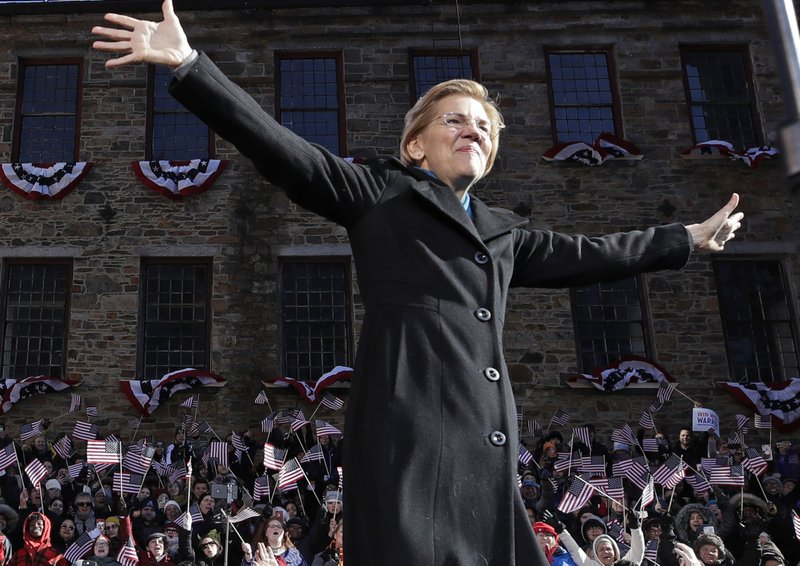LAWRENCE, Mass. -- Democratic Sen. Elizabeth Warren made her bid for the presidency official on Saturday in this working-class city, grounding her 2020 campaign in a populist call to fight economic inequality and build "an America that works for everyone."
Warren delivered a sharp call for change at her presidential kickoff, decrying a "middle-class squeeze" that has left Americans crunched with "too little accountability for the rich, too little opportunity for everyone else." She and her backers hope that message can distinguish her in a crowded Democratic field and help her move past the controversy surrounding her past claims to American Indian heritage.
Weaving specific policy prescriptions into her remarks, from Medicare for All to the elimination of Washington "lobbying as we know it," Warren avoided taking direct jabs at President Donald Trump. She aimed for a broader institutional shift instead, urging supporters to choose "a government that makes different choices, choices that reflect our values."
Trump "is not the cause of what's broken," Warren told an elated crowd without using the president's name. "He's just the latest -- and most extreme -- symptom of what's gone wrong in America."
In a tweet later Saturday, Trump referred to the controversy over her American Indian identity.
"Today Elizabeth Warren, sometimes referred to by me as Pocahontas, joined the race for President," Trump tweeted. "Will she run as our first Native American presidential candidate, or has she decided that after 32 years, this is not playing so well anymore? See you on the campaign TRAIL, Liz!"
Warren announced her campaign in her home state of Massachusetts at a mill site where factory workers went on strike in the early 20th century, a fitting forum for the longtime consumer advocate to advance her platform.
Supporters turned out in below-freezing temperatures, many hoisting signs -- "Win With Warren," one read. A Massachusetts bakery created "Persist" cookies for the event to honor the candidate's slogan, "Nevertheless, She Persisted," words first spoken in the Senate to rebuke her.
Warren's rollout rally was a potent motivator for longtime supporters such as Mo Malekafzaly and Carlos Garcia, two longtime backers who attended her rally from Shrewsbury, Mass.
The choice of Lawrence to start her campaign "shows who she's fighting for," Garcia said. Asked if fellow New Englander Sen. Bernie Sanders could pose a serious threat to Warren in New Hampshire's critical primary should he get into the race, Garcia said Warren is "such an effective communicator that I think that people will respond to that very well."
She intended to hold an event later Saturday in New Hampshire, home to the nation's first primary, and plans to spend today in Iowa, where the leadoff caucuses will be the first test of candidates' viability.
Warren was the first high-profile Democrat to signal interest in running for the White House, forming an exploratory committee on New Year's Eve.
She was endorsed and introduced Saturday by Massachusetts Democrats Sen. Ed Markey and Rep. Joe Kennedy III. Kennedy's backing could prove valuable for Warren, given his status as a rising young Democratic star and his friendship with one of her potential 2020 rivals, former Rep. Beto O'Rourke of Texas.
Warren enters the race as one of the party's most recognizable figures. She has spent the past decade in the national spotlight, first emerging as a consumer activist during the financial crisis. She later led the congressional panel that oversaw the 2008 financial industry bailout. After Republicans blocked her from running the Consumer Financial Protection Bureau, an agency she helped create, she ran for the Senate in 2012 and unseated a GOP incumbent.
She has $11 million left over from her commanding 2018 Senate re-election victory that can be used on her presidential run.
Warren's campaign comes at a challenging moment for the 69-year-old senator. She's apologized twice over the past two weeks for claiming American Indian identity on multiple occasions early in her career. That claim has created fodder for Republicans and could overshadow her campaign.
On Saturday, Trump's re-election campaign manager was quick to respond to her candidacy and called her "a fraud."
Warren got notable backup from New York Sen. Kirsten Gillibrand, however, who called her Senate colleague "an extraordinary public servant." Speaking to reporters in South Carolina, Gillibrand said Trump's treatment of women, particularly minority-group women, was "outrageous."
The campaign will test whether the controversy is simply a Washington obsession or a substantive threat to her candidacy. Doug Rubin, a Boston-based strategist who advised Warren during her first Senate run in 2012, said in an interview that most voters will respond to "the powerful message she's been talking about," in terms of battling social and economic injustices, rather than the back-and-forth over her personal identity.
Information for this article was contributed by Meg Kinnard of The Associated Press.
A Section on 02/10/2019
